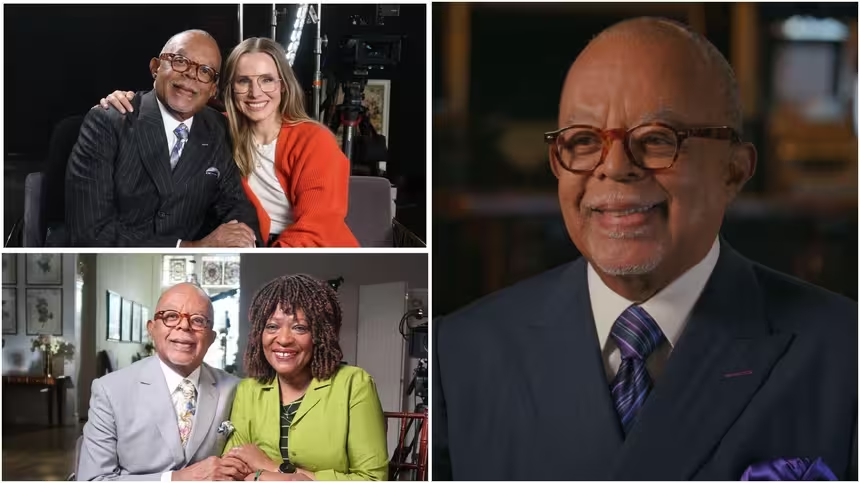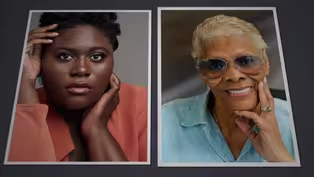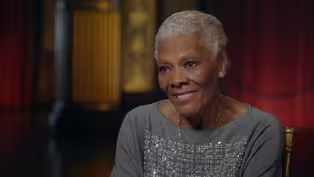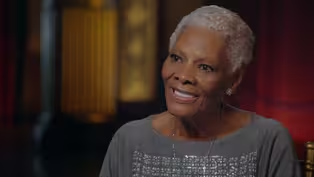Finding Your Roots
Danielle Brooks Learns the Dollar Value of Her Ancestors
Clip: Season 10 Episode 7 | 6m 42sVideo has Closed Captions
Danielle Brooks learns the dollar value of her enslaved fifth great-grandparents.
Danielle Brooks takes a genealogical journey to Lowndes County, Mississippi, tracing her fifth-greatgrandparents, Fraser and Susan Sharp, back to the 1850s. Finding Your Roots uncovered records indicating their status as enslaved individuals on a plantation owned by Elisha Sharp, with Fraser valued at $1350 and Susan and their three youngest children at $2000.
Problems playing video? | Closed Captioning Feedback
Problems playing video? | Closed Captioning Feedback
Corporate support for Season 11 of FINDING YOUR ROOTS WITH HENRY LOUIS GATES, JR. is provided by Gilead Sciences, Inc., Ancestry® and Johnson & Johnson. Major support is provided by...
Finding Your Roots
Danielle Brooks Learns the Dollar Value of Her Ancestors
Clip: Season 10 Episode 7 | 6m 42sVideo has Closed Captions
Danielle Brooks takes a genealogical journey to Lowndes County, Mississippi, tracing her fifth-greatgrandparents, Fraser and Susan Sharp, back to the 1850s. Finding Your Roots uncovered records indicating their status as enslaved individuals on a plantation owned by Elisha Sharp, with Fraser valued at $1350 and Susan and their three youngest children at $2000.
Problems playing video? | Closed Captioning Feedback
How to Watch Finding Your Roots
Finding Your Roots is available to stream on pbs.org and the free PBS App, available on iPhone, Apple TV, Android TV, Android smartphones, Amazon Fire TV, Amazon Fire Tablet, Roku, Samsung Smart TV, and Vizio.
Buy Now

Explore More Finding Your Roots
A new season of Finding Your Roots is premiering January 7th! Stream now past episodes and tune in to PBS on Tuesdays at 8/7 for all-new episodes as renowned scholar Dr. Henry Louis Gates, Jr. guides influential guests into their roots, uncovering deep secrets, hidden identities and lost ancestors.Providing Support for PBS.org
Learn Moreabout PBS online sponsorshipTurning to the maternal side of her family tree, we found ourselves in Lowndes County, Mississippi in the 1850s, looking for traces of Danielle's fifth great grandparents, a couple named Frazier and Susan Sharp.
Their surname led us to a slave schedule for a white farmer named Elisha Sharp.
At the time this schedule was created, Frazier was roughly 35 years old, and Susan, roughly 25.
Do you see any people who match those ages?
I do, I do.
"Three Black males, 37, one Black male, 36 years old, one Mulatto male, 35, one Mulatto male, 37, and one Black female, 25 years old."
Danielle, we believe that two of these people are your fifth great grandparents, Frazier and Susan.
But we wanted to be sure, so we kept on digging.
And let me show you what we found.
- Please turn the page.
- Oh boy, okay.
This is a page from Elisha Sharp's probate record, it's dated May 11th, 1858, and it was filed in the state of Mississippi after Elisha's death.
Would you please read what we transcribed for you?
"A true and perfect inventory and appraisement of the goods, chattels, and personal estate of Elijah H. Sharp, deceased, a negro man named Frazier, age 35 years old, valued at $1,350, a negro woman named Susan, and three youngest children, aged 25, valued at $2,000, a Negro boy named Nelson, age nine, valued at $800."
Oh, that gets me every time.
So, you can see your fifth great grandparents, Frazier and Susan, and their son Nelson, listed on that page and valued.
Wow.
You now know who "owned" your ancestor.
- Yes.
- On your dad's side, and now your mom's side too.
Yeah, it's sad.
It's heartbreaking to think about that, you know?
Yeah, I think it's crazy too, I think about, like, $2,000.
You know, you could win that on a game show in 10 minutes, you know?
- Yeah.
- That's so crazy to me.
So crazy.
Frazier and Susan somehow managed to survive slavery and keep their family together.
We found them in the 1870 census for Lowndes County, living with four of their children.
But freedom brought a new ordeal, one we'd already seen with Dionne's ancestors in Florida: white terror.
In the years after emancipation, Lowndes County exploded with violence against African Americans who tried to exercise their civil rights.
The situation was described in harrowing detail by a man named Robert Gleed, a Black politician who testified before Congress in 1875.
"The election in our city and county was wound up on the 2nd of November, and on the night before we had a very unfortunate occurrence in our city.
Three buildings were set on fire, and four men on that night were killed.
Most of the colored people were run out of their houses during the night, and all the men laid out pretty well."
Ooh.
"And a good many women.
It was the worst time I believe we have ever had in that county as far as an election was concerned."
Ugh!
It makes me feel sick.
The night before the November, 1875 election, a mob of white men scoured Lowndes County murdering four Black men and forcing Black families from their homes.
Your ancestors were living in that county at that time.
And this is only one story, one night.
That's the thing.
Yeah.
Ay, ay, ay.
Let's see what happened, please turn the page.
Okay.
This is another section of Robert Gleed's testimony.
Would you please read that transcribed section?
"We had a meeting, Dr. Lipscomb and Judge Simms, the candidate on the Democratic side, were invited to speak to see if they could suggest some plan by which we could avoid any collision on the day of the election.
He said the way we could have peace was by abstaining from voting altogether."
Can you believe that?
I can believe it.
Is that intimidation or what?
Now, we don't know whether or not your fifth great grandfather, Frazier, attended this meeting, but what do you think he would've felt?
He just gained the right to vote in 1867, and these people are saying, "If you vote, we gonna lynch you."
Mmm.
Yeah, he might've stayed outta that one, which is why we might've survived, you know?
It certainly would've made you think twice.
- Mm-hmm.
- Yeah.
Especially when you have a family to protect.
Danielle's ancestor may well have thought seriously about staying away from the polls or leaving Mississippi altogether, but in the end, he chose a different path.
Oh, snap.
Okay.
This is a record taken in Lowndes County in 1876, one year after those threats made in the 1875 elections.
Would you please read the transcribed section?
"Registered voters in Crawfordville election district.
Names: Frazier Sharp."
Frazier Sharp, he refused to be intimidated.
I love it.
I love his bravery.
That, yes, that is a man right there.
What do you think that meant to him to sign up to register?
Oh my gosh.
I'm sure it was, like he felt, it's like, "I'm not gonna back down."
You know, "Change does need to come."
Yeah.
And to do it for the next generation and the next generation, so I'm very thankful to one of my grandfathers back in the day, 'cause I don't know which one it is.
Your fifth great-grandfather, yeah.
I'm very thankful - to my fifth- - Great-great-great-great- - great grandfather.
- Grandfather.
Video has Closed Captions
Preview: S10 Ep7 | 32s | Henry Louis Gates, Jr. shares ancestry with actor Danielle Brooks & singer Dionne Warwick. (32s)
Dionne Warwick Explores the Roots of Her Singing Grandfather
Video has Closed Captions
Clip: S10 Ep7 | 6m 44s | Dionne Warwick explores her family history, focusing on her maternal grandfather. (6m 44s)
Dionne Warwick Reflects on the Ugly Legacy Slavery
Video has Closed Captions
Clip: S10 Ep7 | 5m 44s | Dionne Warwick reacts powerfully to seeing her ancestor listed in an 1870 slave schedule. (5m 44s)
Providing Support for PBS.org
Learn Moreabout PBS online sponsorship
- History
Great Migrations: A People on The Move
Great Migrations explores how a series of Black migrations have shaped America.












Support for PBS provided by:










